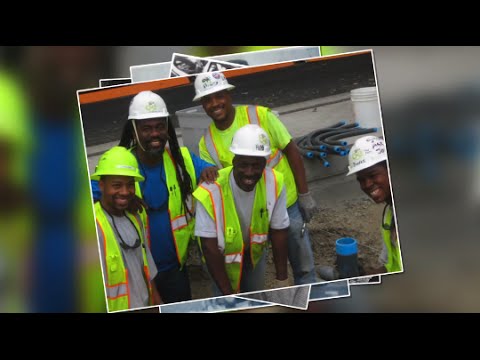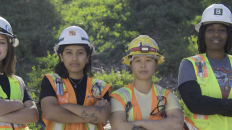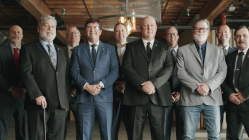“A diverse workforce and a diverse leadership team is key to the success of the IBEW.” – Keith Edwards – Former Business Manager of Local 48 (and first ever African American IBEW Business Manager).
There is no community that is better at sticking to and exemplifying this mission than IBEW Local 48.
It started back in the 1940s, when women and minorities were hired to replace the white, male workforce that had been dominating the trades. Since then, Local 48 has been committed to letting their ranks reflect the community around them. As current Business Manager Gary Young states, reflecting the community makes the IBEW stronger.
To download this video, click here.
Transcript: IBEW Local 48: Committed to Diversity
Welcome to Portland, OR. Everywhere you look – from the lush trees to the Japanese Gardens to the city streets – this city has it all. You will find a diverse family here. Especially in the International Brotherhood of Electrical Workers, Local 48.
But, it hasn’t always been that way. The rising statistics of minorities and women in local 48 have been worked for; and it didn’t come easy.
It’s 1940, Local 48’s membership is not diversified, and every member was a white male. A year later on December 7, 1941, all that would change.
We were at war. All the men were called to war. And civilians were called to defend the nation. In Portland, that meant we needed to build ships – and fast. Several of the shipyards that needed workers were located right here, in IBEW Local 48s jurisdiction. They would employ over 100,000 men and women. Any able body was asked to come, no race or gender distinction.
So women came, and did an excellent job. Local 48 employed not only women, but they were the only brotherhood out of the 14 union that admitted black workers on an equal basis. Unfortunately, it was a temporary situation. When the war ended, women and minorities lost their jobs, an unfortunate and unfair setback to be sure, but at least a foundation for diversity had been laid.
Between 1957 and 1968 IBEW Local 48 began its own grassroots civil rights movement and moved forward in opening the apprenticeships to minorities. NECA started to fund community diversity projects to reach out to African Americans to apply for the apprenticeship. The most important project was the rewiring of the community arts center.
In the 1960s this area was home to 80% of Portland’s African American community. In 1968, Local 48 covered half the cost to have this building rewired when it was the thriving Albina Arts Center. The building was a symbol to the commitment to diversity as they recruited young minorities.
One of those qualified applicants was 19-year-old Keith Edwards who went on to become the first African American Business Manager in the entire IBEW.
“What was the culture like when you joined the IBEW?”
 Keith Edwards – Former Business Manager, Local 48 “It was basically a white male culture when I first came in. There were no women at all and very few people of color. I was also the only business manager to be elected here on a white ticket at Local 48.”
Keith Edwards – Former Business Manager, Local 48 “It was basically a white male culture when I first came in. There were no women at all and very few people of color. I was also the only business manager to be elected here on a white ticket at Local 48.”
In 1976, another young African American by the name of Terry Tims also found a career here at the IBEW.
“What challenges did you face on the job site?”
Terry Tims – Local 48 Retiree “I had a little racism, you know. Guys that didn’t really want to show you how to bend pipe. Really did want to work with you. I had a couple of journeymen that the only reason they wanted to work with me was because they had to. I had this one guy, his name was Greg Peoples, and he ended up being a business manger. He told me just stick with it. He kept me going. Most minorities, in the business trades, you need to be good, our survival was according to what we know.”
In 1984, a man named Ricky Brames decided to leave his job in sales to join the IBEW.
 Ricky Brames Sr. – Local 48 Retiree “They challenges I faced in the IBEW was acceptance at first. You know, when you come on the job and you always had to prove yourself. I won’t say that it was a lot of backlash when we started walking out on the jobs but there was a little bit of uncertainty in people thinking if we were going to make it or what are we doing here, why are we here, are we trying to take their job? A barbershop is a place to still reach out to young men. You know, I could have walked away into the sunset. I’m still involved in the local it gave me an opportunity to stay involved. They will sit in the chair and I will say ‘young man, what are going to do with your life?’ and say ‘have you ever thought of the IBEW?’ I’m always ringing the bell in here for the IBEW. I’m not going to take off the credit; we have a team of support people for these guys. Unsung heroes really. I know in my heart that we changed their lives.”
Ricky Brames Sr. – Local 48 Retiree “They challenges I faced in the IBEW was acceptance at first. You know, when you come on the job and you always had to prove yourself. I won’t say that it was a lot of backlash when we started walking out on the jobs but there was a little bit of uncertainty in people thinking if we were going to make it or what are we doing here, why are we here, are we trying to take their job? A barbershop is a place to still reach out to young men. You know, I could have walked away into the sunset. I’m still involved in the local it gave me an opportunity to stay involved. They will sit in the chair and I will say ‘young man, what are going to do with your life?’ and say ‘have you ever thought of the IBEW?’ I’m always ringing the bell in here for the IBEW. I’m not going to take off the credit; we have a team of support people for these guys. Unsung heroes really. I know in my heart that we changed their lives.”
Years later, from when Keith Edwards, Terry Tims, and Ricky Brames first started their apprenticeship, a lot of progress has been made.
Dominique Lartigue – Apprentice, Local 48 “Coming into the IBEW and seeing a lot of different faces of color and women was relieving. It was relaxing to know that other minorities are in this trade.”
Kevin Eng – Apprentice, Local 48 “I do find a lot of diversity in the workforce. Lots of women and minorities in the trade. All different ages, older younger, first year out of high school. Through the different jobsites I go to there’s definitely a presence and I don’t notice anyone being treated differently.”
 Theresa Riehl – Apprentice, Local 48 “I think people are starting to adjust to the fact that we are joining the men out in the field, you know?”
Theresa Riehl – Apprentice, Local 48 “I think people are starting to adjust to the fact that we are joining the men out in the field, you know?”
There is no doubt that the leadership throughout the years has helped push Local 48 to where it is today. Current Business Manager Gary Young says that there is one word for it.
Gary Young – Business Manager, Local 48 “Solid. It’s solid. It was important to reflect the face of the community. I think they saw value when they had to hire minorities to accommodate the masses needed in the war effort. And once they saw that minorities are a great help here; they are good, skilled craftsmen just like the rest of us, why not reflect what the community is? It gives us more flexibility and makes us stronger.
had to hire minorities to accommodate the masses needed in the war effort. And once they saw that minorities are a great help here; they are good, skilled craftsmen just like the rest of us, why not reflect what the community is? It gives us more flexibility and makes us stronger.
Keith Edwards – Former Business Manager, Local 48 “I think we have come a long way. They’ve got a long ways to go but I’m always going to say that. Because we always have a lot of work to do and we need young people, we need everyone. A diverse workforce and a diverse leadership team is key to the success of the IBEW.
So while our history serves as a lesson on things we need to improve, let us also celebrate the advances we have made. It holds true for life and it holds true for Local 48.
Portland, Oregon; home for all of us.
(3065 views)

















